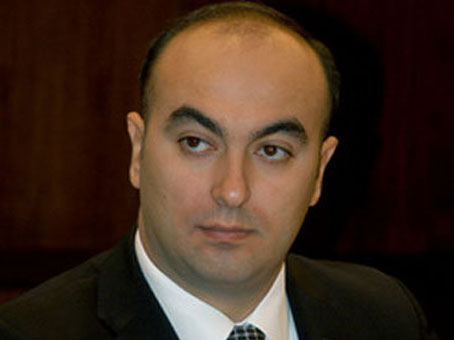Top official: Sargsyan’s statement a return to fascism

By Sara Rajabova
Accusing Azerbaijan of intolerance on ethnic, religious or any other grounds is silly and unfounded, head of the political analysis and information provision department at the Azerbaijani Presidential Administration, Elnur Aslanov, has said.
Commenting on Armenian President Serzh Sargsyan's statement made at the Parliamentary Assembly of the Council of Europe (PACE), Aslanov said that Sargsyan spoke "at length and extensively, but some of his utterances could not go unnoticed".
"For example, he tried to blame Azerbaijan that President Ilham Aliyev as the head of state referred the Armenians to the category of 'number one enemy'. Such nonsense can be responded to only by mere facts: Azerbaijani society is known all over the world by its commitment to values such as inter-confessional tolerance and multiculturalism," Aslanov said.
He noted that up to 30,000 ethnic Armenian citizens live in Azerbaijan and their fundamental rights and freedoms, just like those of the other citizens of Azerbaijan, are guaranteed by the state under the Constitution.
"They work, they are part of the Azerbaijani society, have mass media in the Armenian language, are involved in public life, elections, vote and contribute to the development of the Azerbaijani state. Doesn't this demonstrate the absurdity of the Armenian president's allegations?" Aslanov said.
According to Aslanov, by accusing Azerbaijan of hatred on ethnic grounds in his speech, the Armenian president tried to lay the blame on others. He recalled that his predecessor Robert Kocharyan, speaking at the Council of Europe, voiced a theory of "genetic incompatibility of the Azerbaijani and Armenian peoples", which caused indignation of the international community. Then Secretary General Walter Schwimmer deemed the statement as incitement to war, hostility and rhetoric of intolerance, Aslanov emphasized.
He said that unfortunately, such ideas "find a fertile ground in Armenia today" due to the efforts of Yerevan.
"Whereas Kocharyan cited genetic incompatibility, the supporters of the ruling clan in Armenia continue to build on such ideas, saying that there is 'ethnic, civilizational incompatibility' between Armenians and Azerbaijanis, as Voice of Armenia newspaper said in February 2011," Aslanov said.
He said the Azerbaijani government opposes such an ideology of ultranationalist Armenian circles, which justifies terror acts, occupation of the territory of the neighboring state, ethnic cleansing, and the killings of civilians, including women and children.
According to him, Azerbaijan fights this on all possible platforms, defending the ideals and values that have been historically present in all civilized societies, as well as protecting and asserting the state interests based on these values.
"Serzh Sargsyan said that genocide is not only a heinous crime against humanity, but also a graphic manifestation of fascism and intolerance, as well as an infringement upon the right to life. This was nicely said. Who else would know better what genocide is. Indeed, it was Sargsyan at the time who cynically said to the author of the "Black Garden" book Thomas de Waal, in December 2000, that 'raising a hand against the civilian population', soaking hands in the blood of the innocent old people, women and children of Khojaly was necessary for breaking the stereotype about a peaceful Armenian nation," Aslanov said.
He said that by accusing Azerbaijanis of alleged genetic, ethnic, civilizational, or any other incompatibility, Armenian politicians and their cohorts have also succeeded in accusing Azerbaijanis of incompatibility based on spiritual values, including patriotism.
"Therefore, it was bitter to watch the head of the Armenian state, who was showing a return to the Hitler fascism and Goebbels' propaganda," Aslanov said.
Speaking at the fall session of PACE on October 2, Sargsyan unreasonably accused Azerbaijan of posing artificial obstacles to a settlement of the Nagorno-Karabakh conflict, inciting hatred and the threat of war.
Moreover, at the PACE Sargsyan regarded Nagorno-Karabakh as an example of a democratic society.
Armenia occupied over 20 percent of Azerbaijan's internationally recognized territory, including Nagorno-Karabakh and seven adjacent regions, after laying territorial claims against its South Caucasus neighbor that caused a brutal war in the early 1990s. Long-standing efforts by US, Russian and French mediators have been largely fruitless so far.
As a result of the military aggression of Armenia, over 20,000 Azerbaijanis were killed, 4,866 are reported missing and almost 100,000 were injured, and 50,000 were disabled.
The UN Security Council has passed four resolutions on Armenian withdrawal from the Azerbaijani territory, but they have not been enforced to this day.
Here we are to serve you with news right now. It does not cost much, but worth your attention.
Choose to support open, independent, quality journalism and subscribe on a monthly basis.
By subscribing to our online newspaper, you can have full digital access to all news, analysis, and much more.
You can also follow AzerNEWS on Twitter @AzerNewsAz or Facebook @AzerNewsNewspaper
Thank you!
